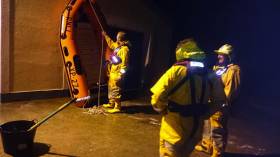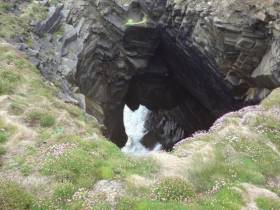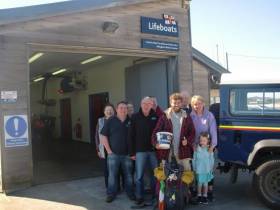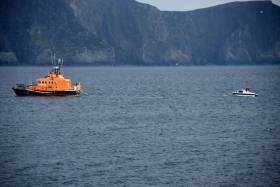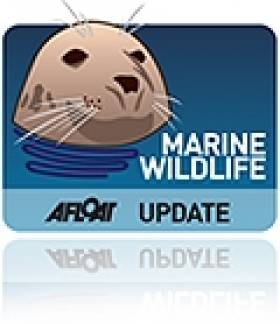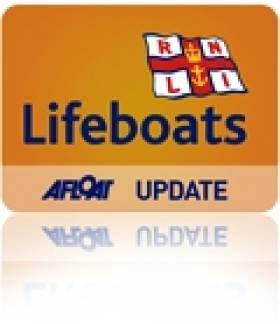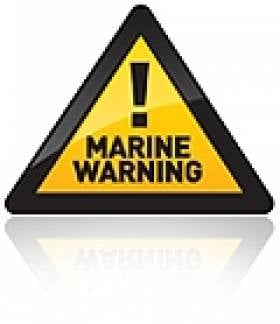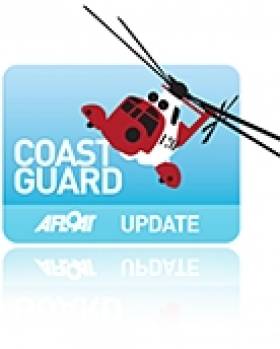Displaying items by tag: Achill
Mini Boat Which Crossed Atlantic to Achill from Newfoundland Due to Be Launched Again
A mini boat that was swept from Newfoundland’s Grand Banks to Achill Island in Storm Erik is due to be relaunched off Ireland sometime in the next few weeks.
The Newfoundland students who first helped to launch the 1.8m (6ft) Raven Kaster are working with Achill island pupils on preparing it for another sea voyage.
This time, it will also collect ocean climate data and may end up off the Iberian coast or up in Scandinavia, depending on where it is launched.
“The way ocean currents work, we don’t know where it will land, and a lot depends on where we launch it again,” Thomas Sheppard, a teacher at Frank Roberts Junior High in Newfoundland, explained.
“The only way it would return to North America is if it is launched off the coast of Africa,” he said.
Canadian students Stephanie Evans and Kaitlyn Grandy, who led the project back in 2018 while at school, recalled that they weren’t sure if they would ever see their little craft again when they were reunited with it for the first time this past weekend in Galway.
“We had the GPS track on it after it was launched by a Maersk ship for us on the Grand Banks in November 2018, and it looked like it was going to bypass Ireland and head south,” Evans recalled.
“Then we saw it heading for a little island off Ireland, and we just hoped there were people there! “ she said.
Raven Kaster, as the craft is named, was washed up on Dookinella Beach on Achill Island after 102 days at sea, and was found there in February 2019 by local fisherman Darren Kilbane.
Evans and Grandy have travelled to Ireland with Sheppard, their teacher, to meet pupils at Coláiste Pobail Acla secondary school and their deputy principal, Karen Lavelle, who are working on the re-launch project.
One of their first stops was at Galway Atlantaquaria in Salthill to view the Raven Kaster. They will also discuss the re-launch logistics with the Marine Institute in Galway this coming week.
Neither Evans nor Grandy had heard of Achill Island when the GPS track indicated it had landed there.
The 1.8m (six ft) boat was purchased through Educational Passages, a non-profit company that runs a mini boat programme.
“Most of them are GPS based, with solar power for the GPS and sail, along with a cargo hold for notes which the students can leave inside,” Sheppard explained.
“Now it is going to be fitted with software which will allow for measuring air temperature, water temperature, orientation, and it will have a camera – stuff we didn’t have available to us when we launched the boat back in 2018,” Sheppard said.
“It wasn’t in bad condition when Darren Kilbane found it, and his daughter Ria is one of the transition year students who has been working on it,” Lavelle explained.
“We hope the Marine Institute’s research ship Celtic Voyager will take it out to the Porcupine before the winter storm season. Depending on the weather and ocean currents, it could go up or down the Atlantic,” she said.
#RNLI - Achill RNLI was requested late on Thursday night (5 January) to help locate and rescue two adult male hill walkers who were in distress in the vicinity of Mweelrea mountain in Killary Fjord, Connemara.
The Irish Coast Guard helicopter was unable to operate because of low visibility, so in a joint operation, Achill RNLI, Mayo Mountain Rescue and Westport Coast Guard combined forces to effect a very challenging rescue.
Achill RNLI’s lifeboat crew were able to locate the hill walkers on the steep cliff face near Rossroe Harbour and then deployed their XP boat, a small dinghy, to transfer seven members of the Mayo Mountain Rescue Team to the cliff face in very difficult conditions.
The mountain rescue team was then able to reach the two people and gradually bring them down the 200ft or so of the cliff face, where Achill RNLI’s crew could ferry them to the waiting lifeboat, The Sam and Ada Moody.
In a lengthy operation under low cloud, fog, rain and gusty winds the Achill RNLI crew went between the water and cliff ferrying the mountain rescue team and the hill walkers back to the lifeboat where the casualties were given first aid treatment before transfer to Rossroe Pier.
There they were handed over to the care of Westport Coast Guard, after suffering from hypothermia and exhaustion.
Achill RNLI coxswain Dave Curtis described the condition of the rescued men as “cold, wet and miserable” and the weather conditions as extremely difficult.
Speaking following the callout, Achill RNLI mechanic Stephen McNulty said: “This was a great example of teamwork between the different rescue agencies.
“The voluntary crew of Achill RNLI is always ready for call out and this is where the training and commitment across the team really pays off. A happy ending is what we always hope for and thankfully that was the case last night.”
Of the two men rescued from the cliff face, McNulty said: “They enjoyed a nice cup of soup on board the Achill RNLI lifeboat – I’m sure it seemed like the best soup they had ever tasted!”
After some eight hours, the Achill RNLI crew arrived back at the lifeboat station around 06.30am on Friday morning (6 January).
Coastguard Cliff Team Recovers Body From Mayo Blowhole
#Coastguard - Coastguard teams from Achill and Ballyglass were involved in the recovery of the body of a young man from a popular tourism spot on the Mayo coast, as Independent.ie reports.
Achill Coast Guard's cliff rescue unit were called into action to recover the suspected faller from the 65ft blowhole at Dun na mBó after reports of a missing person in the area.
A spokesperson for Achill Coast Guard described the almost five-hour operation as "extremely dangerous, challenging and technically difficult" as the casualty was located in a cave within the blowhole, with sea water rushing in from the base.
#RNLI - Alex Ellis-Roswell recently walked into Mayo without any fanfare but with the sole aim to continue his marathon walk to raise funds for the RNLI, a charity close to his heart.
The 23-year-old Kent native is well on his way to smashing a £20,000 (€25,000) fundraising target which will see vital funds raised for the lifeboats.
When he set out 649 days ago, Ellis-Roswell planned to walk along the British coastline only, but he changed his mind and boarded a ferry to Belfast last year to add the beautiful Irish coastline to his journey.
When he finishes he will have walked the entire length of the Irish and UK coasts.
Ellis-Roswell has had many adventures along the way with strangers opening their doors to him and providing food and company for him along the way. Their kindness has seen him almost reach his target, which he now plans to exceed.
The weather had not been kind along the way, and he has pitched his tent in some stunning but remote places with the wind and the rain beating down on him. He has also battled with the toll the epic walk has taken on both his knees.
Starting his walk in Ireland at Belfast last year, he came down along the east coast before rounding the southern coastline and trekking along the Cork and Kerry peninsulas, clocking up hundreds of kilometres.
He has now crossed the border into Mayo and the sun has come out to match the hospitality of the locals to make it a special stop on his journey. Two important places for him to call in to visit have been the Achill and Ballyglass RNLI lifeboat stations, where he was made feel very welcome.
Commenting on the incredible fundraising initiative when Ellis-Roswell stopped by to visit the lifeboat crew and fundraisers with Ballyglass RNLI, the station’s volunteer lifeboat press officer Agatha Hunt said: "We were honoured to welcome Alex to our door and to hear about his adventures so far. It is incredible to think that a young man from across the water would do this for a charity which is very close to all of us here.
"Every lifeboat station and volunteer shares a common goal to save lives and help those in difficulty but it is very touching to see someone so young doing this to help in our work. I know his father, who also had great affection, for the RNLI would have been very proud of him."
Huge thanks are also due to the Broadhaven Bay Hotel, Léim Siar B&B Blacksod, Western Strand Hotel and the Kilcummin Lodge B&B who supported the young man in his walk by providing accommodation during his visit.
If people wish donate to Alex Ellis-Roswell they can do so via his online fundraising page. He is also cataloguing his journey on social media and can be followed on Facebook or Twitter.
Three Callouts In 24 Hours For Achill Lifeboat
#RNLI - If ever the importance of a constant state of readiness was underlined then a single 24-hour period, this week has been a reminder of this for the volunteer lifeboat crew at Achill RNLI.
The first of three callouts came on Wednesday night (11 May) at around 10.30pm when the station’s all-weather lifeboat Sam and Ada Moody was requested to launch by the Irish Coast Guard to support the evacuation of an elderly patient from Inishturk Island, who was transferred to hospital by coastguard helicopter.
On Thursday afternoon (12 May) at 5.15pm, the lifeboat was called on again, this time to locate and rescue a small cabin boat that encountered engine failure about a mile and a half west of Dooega Head.
The distressed boat, which was crewed by four people, had to be located and then towed to Purteen Harbour, where it was brought safely ashore by a D-class inshore boat from Achill Coast Guard. Excellent weather conditions were a help to the smoothness of the recovery.
Finally, on Thursday evening a local doctor requested the assistance of Achill RNLI to take a patient from Clare Island into Cloughmore, where the patient was transferred by ambulance to hospital.
Speaking following their busy 24 hours, Achill RNLI coxswain Dave Curtis said: :Our volunteers are always on call and ready to respond when needed and we were delighted to be of assistance.
"The response to each call out demonstrated good team work with our colleagues in the coastguard, while the rescue of the cabin boat was a good example of our RNLI training paying off. We would like to wish the patients a speedy recovery."
Achill RNLI Lifeboat crew Member Ties the Knot
Achill Island RNLI crew joined in the celebrations as long serving crew member Alan Gielty wed wife Maeve Clancy last weekend.
The crew kitted out in full lifeboat gear outside St Kevin’s Church in Wicklow to give Alan who has been on the lifeboat crew for 15 years, and his new wife Maeve, a special guard of honour.
Alan met Maeve in the local Clew Bay Pub and Restaurant which he owns and runs on Achill Island.
The couple were married in Maeve’s home village of Hollywood and guests gathered afterwards in the Mount Wolseley Hotel in Carlow for the wedding reception.
One of the day’s highlights was an epic best man’s speech which was delivered in song with the mandolin for accompaniment, by Alan’s brother Diarmuid.
During the eight minute long tribute which had guests roaring with laughter, Alan’s dedication to Achill Island RNLI got a mention: ‘There’s still an old flame in Alan’s heart so true. And when he gets the call poor Maeve you know he’ll leave you. Regardless of what you are doing he’ll drop tools and leave you be, and hop out on the lifeboat to save someone at sea.’
On behalf of Achill Island RNLI, Lifeboat Operations Manager Tom Honeyman said: ‘Alan joined the crew here in Achill in 2002 and has been a dedicated member at our lifeboat station ever since. He is a qualified crew member, first-aider, and navigator and is also a trainee Coxswain. We are delighted that he has found happiness with Maeve and we wish them the very best for their future.’
#dolphinstrandings – As Afloat.ie reported earlier, a County Mayo woman Ina Kruger successfully rescued a stranded dolphin at Easter on Keem beach, Achill. Originally rescued on Easter Sunday, the dolphin returned to the beach where the body of a second dolphin was discovered. Fortunately, the second rescue attempt was more successful and the dolphin hasn't been seen since.
RNLI Achill Island's 17 hour Callout to Fishing Vessel in Trouble off Mayo Coast
#rnli – Lifeboat crew with Achill Island RNLI returned home in the early hours of this morning (Friday 20 September) after a marathon callout to a fishing vessel 54 miles west of Achill Island off the Mayo coast. The lifeboat crew battled rough sea conditions for seventeen hours to bring the fishing vessel, with five crew onboard, safely home.
The call for help was raised just before 11am yesterday morning (Thursday 19 September) from a 22 metre fishing vessel. The crew had been hauling in their nets when they became entangled in the boats propellers and they could not move. Sea conditions were poor with force seven to eight and four to six metre sea swells.
The lifeboat crew arrived on scene in three hours and set about establishing a tow with the casualty vessel. Once that was established they started on the long journey back to shore at a slow speed. However the damaged propellers were causing a problem with the steering of the fishing vessel and with the strong conditions the tow broke twice and both times had to be re-established by the crew.
The Achill Island lifeboat arrived back with the casualty vessel under tow at 4am but due to tides was unable to bring it safely to shore. They moored it outside the harbour and after a few hours rest launched again at 7am to bring it safely inside the harbour.
Commenting on the callout Achill Island RNLI Lifeboat Operations Manager Tom Honeyman said, "This was a very challenging callout for an experienced lifeboat crew. Due to the terrible weather the seven crewmembers onboard the lifeboat had to keep a constant watch on the vessel. When the tow broke twice they had be on deck in rough conditions to ensure it was re-established quickly.
They are an incredible bunch of people and some of them only got a few hours sleep before having to go out to their jobs after being at sea for the previous 17 hours. The lifeboat is so important to communities such as ours in Achill and the people who volunteer for the service are a credit to the RNLI."
Marine Notice: Rock Placements Off Co Dublin & Buoy Deployments Off West Cast
#MARINE WARNING - The latest Marine Notices from the Department of Transport, Tourism and Sport (DTTAS) advise mariners to keep a look-out for rock placement off north Co Dublin and buoy placements off Co Mayo and Co Clare.
Operations were due to commence on Saturday 8 September at North Beach in Rush, Co Dublin for the placement of rocks offshore and in the Irish Sea for a period of 10-12 days weather permitting.
The works are being undertaken by DPFPV Tideway Rollingstone (call sign PHYR) and DPFPV Stornes (call sign PCKX) at various locations detailed in Marine Notice No 49 of 2012, a PDF of which is available to read or download HERE.
These vessels are operating on a 24-hour basis and will display appropriate days shapes and lights. They are also transmitting an AIS signal and will keep a listening watch on VHF Channel 16 for the duration of the works, which involve the deployment of survey ROVs and fall pipe that will restrict the vessels' movements. All mariners are instructed to give a wide berth.
Meanwhile off the west coast, ESB International has deployed two Waveroder buoys as positions near Achill Island in Co Mayo and Doonbeg in Co Clare.
The Achill buoy will be operational for a minumum of three months from now, while the Killard buoy will be operational for a minimum of 10 months having been recently relocated. Both are spherical and yellow in colour. All vessels are requested to give the buoys a wide berth.
Full details of their positions are included in Marine Notice No 50 of 2012, a PDF of which is available to read or download HERE.
Seven New Coast Guard Boats in €2M Safety Programme
€1.5 million has been allocated for 7 new Coast Guard boats as part of its boat renewal programme;
€300,000 will be used to purchase new vans for the Coast Guard's volunteer rescue teams;
€200,000 will be used to update the Coast Guard's pollution response equipment to best international standards.
Separately, Minister Varadkar is backing an Irish Coast Guard initiative to have a new European Coast Guard Secretariat based full-time in Dublin.
Speaking today, Minister Varadkar said: 'I'm very happy to allocate extra resources to the Coast Guard to upgrade its vital equipment, including seven new boats, along with replacement vans and pollution control materials. One of the new Rigid Inflatable Boats (RIBs) has been allocated to Achill Coast Guard, and the remainder will be allocated to Coast Guard Stations around Ireland over the next 12 months, according to priority.
"Everyone who goes to sea owes a debt of gratitude to the Coast Guard, as do their family and friends. The Coast Guard responds to emergency call-outs, and saves lives, at all hours of the day and night, throughout the year. Much of the Coast Guard's work is only possible through the large network of individual and group volunteers."
Minister Varadkar also congratulated the Director of the Irish Coast Guards, Chris Reynolds, who has been elected the new Chair of the European Union Heads of Coast Guard. The annual Heads of Coast Guards of Europe's meeting will now take place in Dublin next August.
Mr Reynolds has been asked specifically to prepare the ground for a permanent Secretariat, manned by Coast Guard Officers from Member States, the EU Commission and various agencies. The Secretariat will meet in Dublin for its inaugural year, and Mr Reynolds will propose to have the Secretariat based in Dublin on a permanent basis.
Additional info:
New Delta 900 SUPER X RIBs for Irish Coastguard
The Irish Coastguard's new Delta 900 SUPER X Coast Guard RIBs are 9.00m overall and will be in service off the Republic of Ireland's coast.Jun 07, 2011 - From its early days in 1979, the Delta Power Group (builder of Delta RIBs) has grown to become one of the most successful and highly regarded designers and builders of commercial RIBs for the world market.
This enviable position has been achieved through a simple business philosophy. Delta has not burdened itself with debt to fuel growth, preferring to expand organically by concentrating on contracts that remain strictly within its targeted commercial sector, winning business from successful organisations; which in turn generates repeat orders and new contacts.
A recent Irish Coastguard contract is not for just one craft; but covers a five year programme to supply 12 highly specified boats. Delta's Military and Law Enforcement range comprises nine models and these are offered with different specifications depending on usage.
The Irish Coastguard's new Delta 900 SUPER X Coast Guard RIBs are 9.00m overall and will be in service off the Republic of Ireland's coast. Twin Yamaha F225B engines give a maximum speed of 40 knots and a cruising speed of 32 knots. Safety equipment is to MSO P6 Passenger Boat and other equipment is to MCA Category 3 rating. The extensive specification includes Shockwave mitigating seating for all the crew. And it also features Delta's standard procedure of terminating all wiring looms in fully waterproof housings with Deutsch connectors to ensure maximum in service reliability; essential, since the Irish Sea and Atlantic Ocean can throw up very demanding operational conditions.
In addition, Delta is one of the few major Commercial RIB builders to run the processes of laminating, tube making and outfitting completely 'in house' (on its wholly owned and secure 2.2 Acre freehold site) in 79,000 sq.ft of covered space. This ensures maximum Management and Quality Control. Delta is certified to ISO 9001: 2008 and is able to build under full survey of all the major Classification Societies.
As a result, Delta's extensive international client base now includes ERRV, Marine Police, Border Control, Customs & Excise, Navies, Special Forces, Coastguards, Search & Rescue services, Law enforcement agencies, Military and Port Authorities; to name just a few.


























